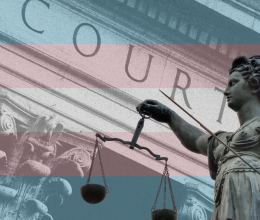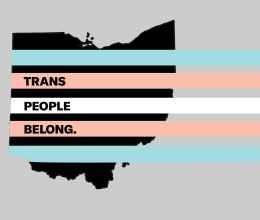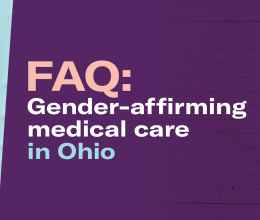Chair Manchester, Vice-Chair Cutrona, Ranking Member Denson, and members of the House Families, Aging, and Human Services Committee, thank you for the opportunity to provide testimony. My name is Micah Mitchell. I am a Master of Social Work/Ph.D candidate at The Ohio State University, a research associate at the Kirwan Institute for Race and Ethnicity, and a policy fellow at the ACLU of Ohio. I am also transgender.
I have written and rewritten this testimony dozens of times over. After hearing two days of proponent testimony, the researcher in me wanted to meticulously debunk every myth, inaccurate research study, and flagrant lie spoken before the committee. The human in me wanted to shrink and disappear. Proponents dismissing trans suicide rates do not understand the pain of listening to individuals without personal knowledge of what it means to be trans debate your very
existence.
I will not spend my testimony regurgitating the overwhelming scientific evidence in favor of gender-affirming care for trans youth, evidence that is publicly available and backed by the American Academy of Pediatricians, the Endocrine Society, the American Academy of Child and Adolescent Psychiatry, and the American Psychiatric Association. Instead, I will speak from the most important qualifier of an expert: lived experience.
I was seven years old when I first realized I was different.
I had just returned home from an afternoon in the woods with friends. Mud covered my face and clothing. My mom took one look at me and asked in anger, "Can't you just act like a girl for once?" Until that point, I didn't know that I was acting in a way that I shouldn't have been. I was acting like me.
I was sixteen years old when I first learned the term "transgender." I had been suffering from severe dysphoria and internalized pain for years. While scrolling on the internet, I stumbled across the blog of a trans man who started hormone replacement therapy six months prior. He talked about how his life changed for the better, how his gender dysphoria reduced, and how he finally started feeling comfortable in his own skin. I cried for hours out of happiness, relief, and pain. I spent the first sixteen years of my life believing that something was innately wrong with me. I thought my life was a mistake, that I shouldn't be alive. Staring at my computer screen in 2008, I learned I was not alone for the first time in my life.
I was 27 years old when I came out as transgender. I made an appointment at Equitas Health and initially didn't tell anyone, terrified of what people would think of me. I feared that it would cost me my friends, family, career, and life as I knew it. But by that time, the pain of dysphoria was greater than any pain I could have possibly endured by coming out. I spent the past ten years drowning my truth in alcohol and drugs. Twenty-seven years of life and not a single person knew the real me. Ten years of addiction and no amount of drugs, denial, or time could take away who I was.
I am now 30 years old. Since coming out as trans, I finally maintained my sobriety. I discovered my passion for social justice, switched career paths, and went back to school for my third college degree. The OSU College of Social Work accepted me into their Ph.D. program. Two academic journals published articles that I co-authored. Most importantly, I found community, I found
happiness, I found purpose, and I found peace. I learned to give and receive healthy love. I go to sleep each night knowing that I am putting good into this world because I live my truth. But because of House Bill 454, I now fear that kids like me will have gender-affirming healthcare revoked, the very healthcare that saved my life as an adult and would have prevented me from so much harm had it been accessible as a kid. All I needed was one adult, one single professional to affirm that what I was feeling was okay and that help existed. For the vast majority of youth, this is what gender-affirming care consists of: adults in their life affirming their identity and facilitating a social transition. Ohio House Bill 454 will devastate trans youth across Ohio if passed into law.
To be a trans adult is to be an expert of what it means to be a trans child. To be a trans adult is to know the confusion of being punished for who you are at an early age. To be a trans adult is to understand the pain of hiding who you are for your safety while feeling increasingly unsafe with yourself. To be a trans adult is to know the agony of growing up feeling isolated and utterly alone because of a lack of trans education. To be a trans adult is to understand the pain of being dismissed as "mentally ill" or "confused" by those without any lived experience or expertise.
To be a trans adult is to know that, in some ways, trans kids today have it even worse than we did 20 years ago. Transphobic legislation berates them with constant messages disregarding their lived experiences and trivializing their pain. It makes navigating an already transphobic world even harder.
Please vote no on Ohio House Bill 454. Thank you.







